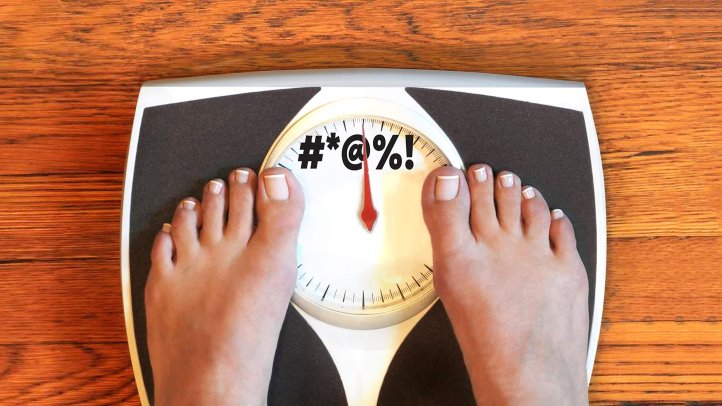
Does GABA cause weight gain? When you’re working out, your body produces a stress response that is also known as the “fight or flight” response. This is triggered by raising your adrenaline and increasing your heart rate to prepare you for taking flight or fighting your enemy.
In this state, your body burns more fat than in a resting state because it needs more energy to run away from danger or fight back. It does this by releasing a group of hormones called catecholamines, which are also referred to as “stress hormones”.
These include adrenaline, noradrenaline, and the lesser-known but closely related hormone: GABA. The benefits of GABA for weight loss are well-documented. This amino acid can help you feel calm and focused while lowering stress levels and relieving anxiety.
Related: Anxiety and weight relationship

Contents
Does GABA Cause Weight Gain?
There is no direct evidence to suggest that gamma-aminobutyric acid (GABA) causes weight gain. GABA is an inhibitory neurotransmitter that helps to regulate brain activity, promote relaxation, and reduce anxiety. While GABA supplements are sometimes marketed as weight loss aids, there is limited research to support these claims.
That being said, there are a few indirect ways in which GABA could potentially contribute to weight gain. For example, chronic stress and anxiety can disrupt the balance of hormones in the body, including those that regulate appetite and metabolism. By promoting relaxation and reducing anxiety, GABA may help to counteract some of the negative effects of stress on weight.
Additionally, some studies have suggested that GABA supplementation may improve sleep quality, which could indirectly support weight loss efforts. Poor sleep has been linked to increased appetite, decreased metabolism, and weight gain, so getting adequate sleep is an important factor in maintaining a healthy weight.
Overall, while there is no direct evidence to suggest that GABA causes weight gain, the potential benefits of GABA for reducing stress, improving sleep quality, and promoting relaxation could indirectly support weight loss efforts. However, more research is needed to understand the relationship between GABA and weight management fully.
Will GABA make me gain weight?
GABA supplements are also said to promote weight loss because they can increase the production of HGH (human growth hormone). This hormone has been known to reduce body fat because it stimulates the release of lipolysis, which breaks down fat cells.
HGH production may also be increased by GABA if people who are taking GABA have a tendency to lose body fat because of high HGH levels. However, some people believe this is not the case and while GABA may help reduce anxiety it may not necessarily lead to weight loss or an increase in HGH levels.
GABA is a chemical that is naturally found in our brains and has a calming effect on nerves. It is thought to be responsible for reducing anxiety, stress and promoting restful sleep. GABA supplements are used to assist with these problems because it can be difficult for the body to produce enough on its own.
Does gabapentin cause weight gain?
Gabapentin has been reported to potentially cause weight gain. There is a difference between Gabapentin and GABA. GABA is a neurotransmitter found in the brain. It is also the name of a drug that is used to treat seizures and certain types of pain, with side effects including drowsiness, dizziness, nausea, and weight gain.
In recent research, it has been discovered that GABA may also have strong effects on food intake and water retention at the extremities all linked to changes in body weight. It is thought that GABA helps to regulate appetite by suppressing appetite-inducing hormones serotonin (which increases your feeling of fullness) and ghrelin (which makes you feel hungry).
How might GABA cause weight gain?
There is no direct evidence to suggest that gamma-aminobutyric acid (GABA) causes weight gain. However, there are some indirect ways in which GABA could potentially contribute to weight gain.
One possibility is that GABA supplements could cause drowsiness or sedation, which could lead to decreased physical activity and a subsequent increase in weight. However, this is not a common side effect of GABA supplementation, and there is limited research to support this idea.
Another potential mechanism by which GABA could contribute to weight gain is through its effect on appetite. While GABA is primarily known for its role in reducing anxiety and promoting relaxation, it may also play a role in regulating appetite and food intake. Animal studies have suggested that GABA can stimulate the release of the hormone ghrelin, which is known to increase appetite and promote weight gain. GABA is a brain chemical that suppresses food intake (−30%). This reduces body-weight gain and reduces fat accumulation. Moreover, GABA induces ketogenesis, improves glucose metabolism, and elevates the levels of circulating GABA and β-amino-isobutyric acid.
Some studies have shown that GABA can affect metabolism by altering gut motility and decreasing lipolysis, which causes weight gain. GABA is also found in some foods such as chocolate, green tea, soy protein, and tomatoes. However, it’s important to note that these findings have not been consistently replicated in humans, and more research is needed to understand the relationship between GABA and appetite regulation.
The other way that GABA can cause weight gain is through water retention. The fluid buildup in the legs (edema) is one of the rarely seen ways that GABA causes weight gain. Moreover, concentration-dependent peripheral edema of early onset can be seen in some people taking GABA.
Overall, while there are some theoretical mechanisms by which GABA could potentially contribute to weight gain, there is currently no direct evidence to support this idea. More research is needed to understand the relationship between GABA and weight management fully.
GABA is a neurotransmitter in the central nervous system. It’s found in every part of the brain, spinal cord, and nerves. GABA has many functions, including calming or relaxing the body and reducing anxiety.
Why does gabapentin cause weight gain?
The exact mechanisms by which gabapentin may lead to weight gain are not fully understood, but several factors could contribute to this side effect:
- Increased appetite: Gabapentin may affect certain brain receptors that regulate appetite, potentially leading to an increase in hunger or cravings. This can result in consuming more calories and ultimately lead to weight gain.
- Metabolic changes: Gabapentin could potentially affect metabolic processes, including the body’s energy expenditure and the way it processes nutrients. Slowed metabolism or changes in the way the body utilizes calories could contribute to weight gain.
- Reduced physical activity: Some individuals may experience fatigue, drowsiness, or sedation as side effects of gabapentin. These effects could lead to a decrease in physical activity or exercise, which can contribute to weight gain over time.
- Fluid retention: As mentioned earlier, gabapentin can cause peripheral edema, which involves fluid retention and swelling in the extremities. While this fluid retention may not directly contribute to fat gain, it can lead to overall weight gain due to increased water weight.
It’s important to note that not everyone who takes gabapentin will experience weight gain, and the extent of weight gain can vary among individuals
GABA and Metabolic changes
GABA (gamma-aminobutyric acid) is a neurotransmitter in the central nervous system that plays a role in regulating brain activity. It does not directly cause metabolic changes that lead to weight gain. In fact, GABA has been associated with certain metabolic benefits, such as promoting relaxation and reducing stress.
Weight gain is influenced by a variety of factors, including diet, physical activity, genetics, hormonal balance, and overall caloric intake. However, GABA itself is not directly involved in metabolic processes that contribute to weight gain.
It’s important to note that GABA supplements are available, and some individuals may take them to potentially promote relaxation or improve sleep. However, the impact of GABA supplements on weight gain or metabolic changes has not been extensively studied, and more research is needed to fully understand their effects on the body.
Does GABA cause water retention?
GABA is a neurotransmitter that is formulated as gabapentin medication commonly prescribed for conditions such as epilepsy, neuropathic pain, and restless legs syndrome. Gabapentin can sometimes lead to side effects, and one of the potential side effects is peripheral edema, which involves fluid retention and swelling in the extremities (such as the hands, arms, legs, and feet.).
This side effect is more commonly observed in older individuals or those taking higher doses of gabapentin. Edema is through concentration-dependent peripheral edema of early onset.
It’s important to note that individual reactions to medications can vary, and not everyone will experience the same side effects. If you have concerns about water retention or swelling while taking gabapentin or any other medication, it’s advisable to consult with your healthcare provider for further evaluation and guidance.
Does GABA increase appetite?
It was found that the GABAergic system, which promotes neuronal inhibition, also plays an important role in regulating feeding. The study showed that chronic administration of GABA leads to increased food intake and body weight gain. We know that GABA is released by hypothalamic neurons and inhibits the release of AgRP and NPY, two neuropeptides that are responsible for appetite stimulation.
Researchers hypothesize that when GABA release is reduced by artificial sweeteners like saccharin or aspartame, it could cause a disruption in the body’s natural response to sugar. This could lead to compensatory overeating or weight gain.
As saccharin-sweetened water consumption has been shown to increase body weight gain in rats, further research is necessary to determine whether this effect can be seen in humans as well.
Does gabapentin cause weight gain and bloating?
Yes, gabapentin can potentially cause weight gain and bloating as side effects but they’re not common side effects. While not everyone will experience these side effects, they have been reported in some individuals taking gabapentin.
Weight gain can occur due to various factors, including increased appetite, slowed metabolism, or fluid retention. Bloating refers to a feeling of fullness or swelling in the abdomen, often accompanied by gas or discomfort.
If you are taking gabapentin and are concerned about weight gain or bloating, it is recommended to discuss your symptoms with your healthcare provider. They can provide further guidance, evaluate your specific situation, and explore possible alternatives if necessary.
Foods high in GABA

Gaba is present in many foods and drinks, including:
- Cruciferous vegetables (broccoli, cabbage, cauliflower, Brussels sprouts)
- Soybeans & Adzuki beans.
- Peas.
- Mushrooms.
- Spinach.
- Tomatoes.
- Buckwheat.
and even some plant products such as bananas. If you want to reduce your GABA intake then it is a good idea to avoid as many of these types of food as possible.
Is Gaba Bad for You?
It is often thought that a high intake of natural sugars can lead to weight gain, but recent research has shown that artificial sweeteners can also lead to weight gain by disrupting the body’s natural response to sugar.
Gaba is one such artificial sweetener and it has been found to have strong effects on food intake and body weight gain in addition to its peripheral effects. This article evaluates the side effects of GABA, what foods it is found in and how you can reduce your intake should you wish to do so.
Is GABA good for fat loss?
GABA has been shown to be an effective fat-loss tool. In one study, it was found that GABA supplementation resulted in significant reductions in weight and fat mass, improved muscle strength and tone, increased energy levels, and a more positive mood.
It has been proven that GABA suppresses food intake by up to 30%. This ensures that there is no body-weight gain and fat accumulation. Moreover, GABA induces ketogenesis, improves glucose metabolism, and elevates the levels of circulating GABA and β-aminoisobutyric acid.
Therefore, GABA reduces body fat and triglyceride levels while it increases lean muscle mass. Thus, it is recommended for a positive impact on fat loss and increased muscle mass. Most people know GABA as the “chill pill.
Why do bodybuilders take GABA?
Research indicates that GABA supplementation may also increase GH serum levels and protein synthesis. This post-exercise GABA/protein supplementation protocol may help enhance training-induced muscle hypertrophy.
Gaba (Gamma-Aminobutyric Acid) is a common neurotransmitter found in the brain. Within the central nervous system, it serves as an inhibitor, reducing neuronal excitability and regulating muscle tone. In the peripheral nervous system, GABA regulates blood pressure and acid-base balance.
Some athletes and bodybuilders take GABA supplements to improve protein synthesis after exercise, which may help enhance muscle hypertrophy. Researchers also believe that post-exercise supplementation with GABA and protein could increase growth hormone levels.
What is Gaba?
GABA is a neurotransmitter, which means that it acts as a chemical messenger in the brain. GABA is an inhibitory neurotransmitter, meaning that it slows down nerve cells and reduces the frequency of their firing. It is this slow-down effect that results in feelings of calmness or drowsiness.
In a recent study published in the Journal of Nutrition, central nervous system GABA was found to suppress appetite and reduce weight gain through its effects on leptin levels and energy expenditure.
Leptin is a hormone that helps regulate appetite by communicating with brain cells (neurons) to increase or decrease hunger levels. This study showed that GABA can regulate leptin levels and energy expenditure, both of which are known to affect body weight and fat storage.
GABA is found in many foods, including cereals, vegetables, and sugar-free products. It is also a neurotransmitter that plays a role in reducing anxiety and treating insomnia.
Final Words
Gaba has been shown to have a positive effect on the central nervous system, alongside its peripheral neurological effects. However, recent studies have also shown that it can cause weight gain by interfering with the body’s natural response to sugar.
There are many great tools for measuring how much sugar you consume each day – from apps like MyFitnessPal to wearable devices such as FitBit or Jawbone. If you want to reduce your sugar intake, there are plenty of options for foods with lower glycemic indexes and artificial sweeteners that won’t interfere with your body’s natural response to sugar.
Gaba is an amino acid found in our body. It is also found in certain foods, such as soy, grape juice, and bananas. According to recent research into the effects of GABA on weight loss, it has been found that consuming GABA may lead to weight gain.
The research suggests that for people who are at a healthy weight, GABA may have no effect on their bodies. However, for those who are already obese or overweight, GABA can have strong effects on their food intake and body weight gain. If you want to avoid the side effects of GABA or reduce your intake without having to cut out so many natural sources of it from your diet, consider taking a supplement instead.
FAQs
What is GABA?
GABA stands for “Gamma-Aminobutyric Acid”, and it is a kind of amino acid that is found in many different foods. The most common sources of GABA are soy products such as tofu, miso and tempeh. Other sources of GABA can include fish, chicken, beef, or lamb.
How does it work in the body?
GABA inhibits the release of neurotransmitters which are key to regulating moods, feelings and emotions. It may also affect food intake by reducing the desire to consume sugar or carbohydrates which can lead to weight gain. Nowadays there have been studies on whether or not GABA could be a cause for weight gain due to its effects on neurotransmitters and sugar consumption.
Can eating tofu and tempeh lead to weight gain?
Yes! But only if you eat too much of them. Excessive amounts of soy can lead to weight gain by disrupting your metabolism over time which can lead to insulin resistance. However, if you eat small amounts of these foods it should have no effect on your weight whatsoever.
Why do people take GABA?
People take GABA as a supplement to try to improve mood, relieve anxiety, and reduce the symptoms of depression, ADHD, and epilepsy. It gives the person a calming effect thus helping reduce the symptoms of these conditions.
Should I take GABA before bed?
Gabain, a type of GABA found in fermented food, can be beneficial in some cases but may also have side effects. You should take GABA one hour before going to bed to increase sleep time and decrease the time it takes to fall asleep
Can I use GABA for weight gain?
If you want to use GABA for weight gain, you should make sure that it is used as part of a healthy diet plan. This means that you need to consume an adequate number of calories each day and not overeat.
Are there any risks to taking GABA?
There are risks associated with taking GABA, including the possibility of addiction. The majority of people do not experience any side effects from taking it, but they may be at risk if they have certain sensitivities or allergies.
